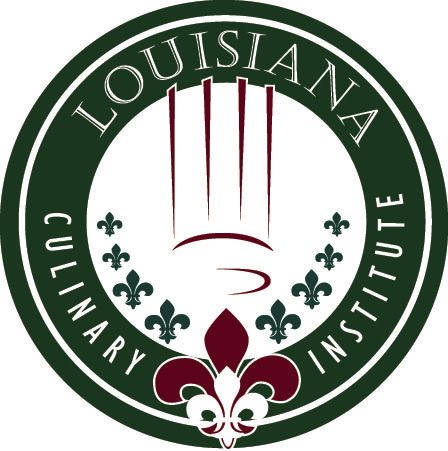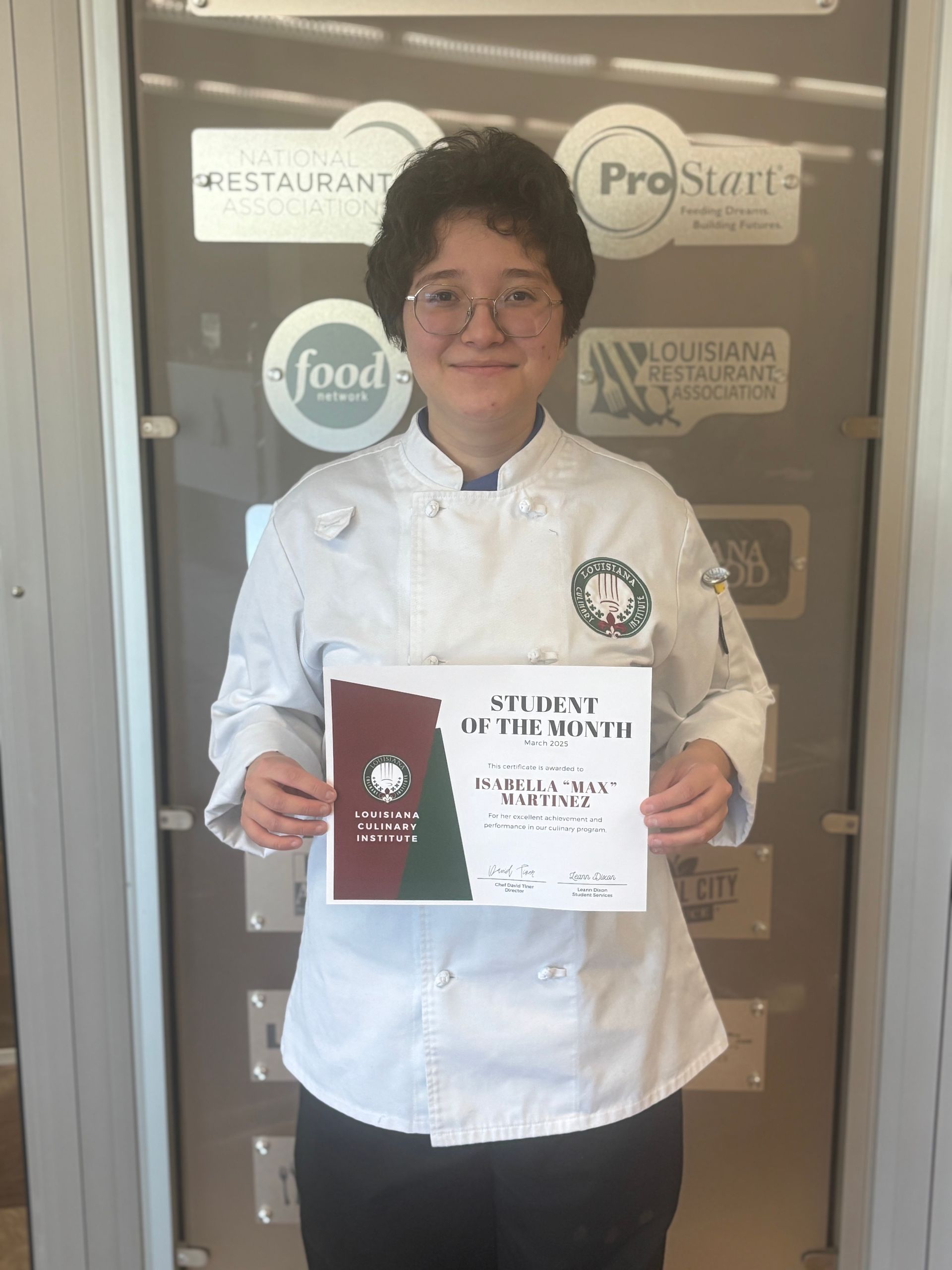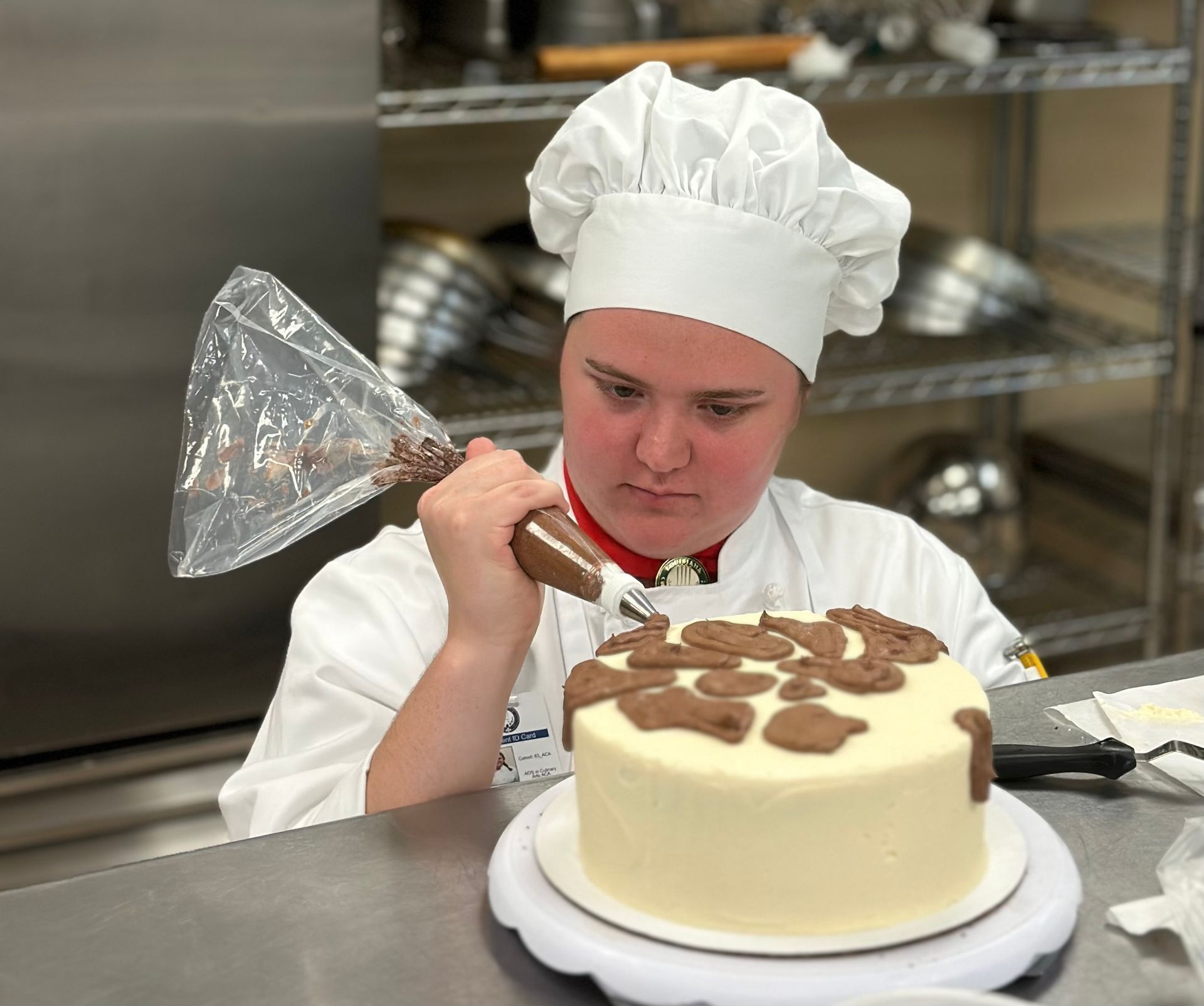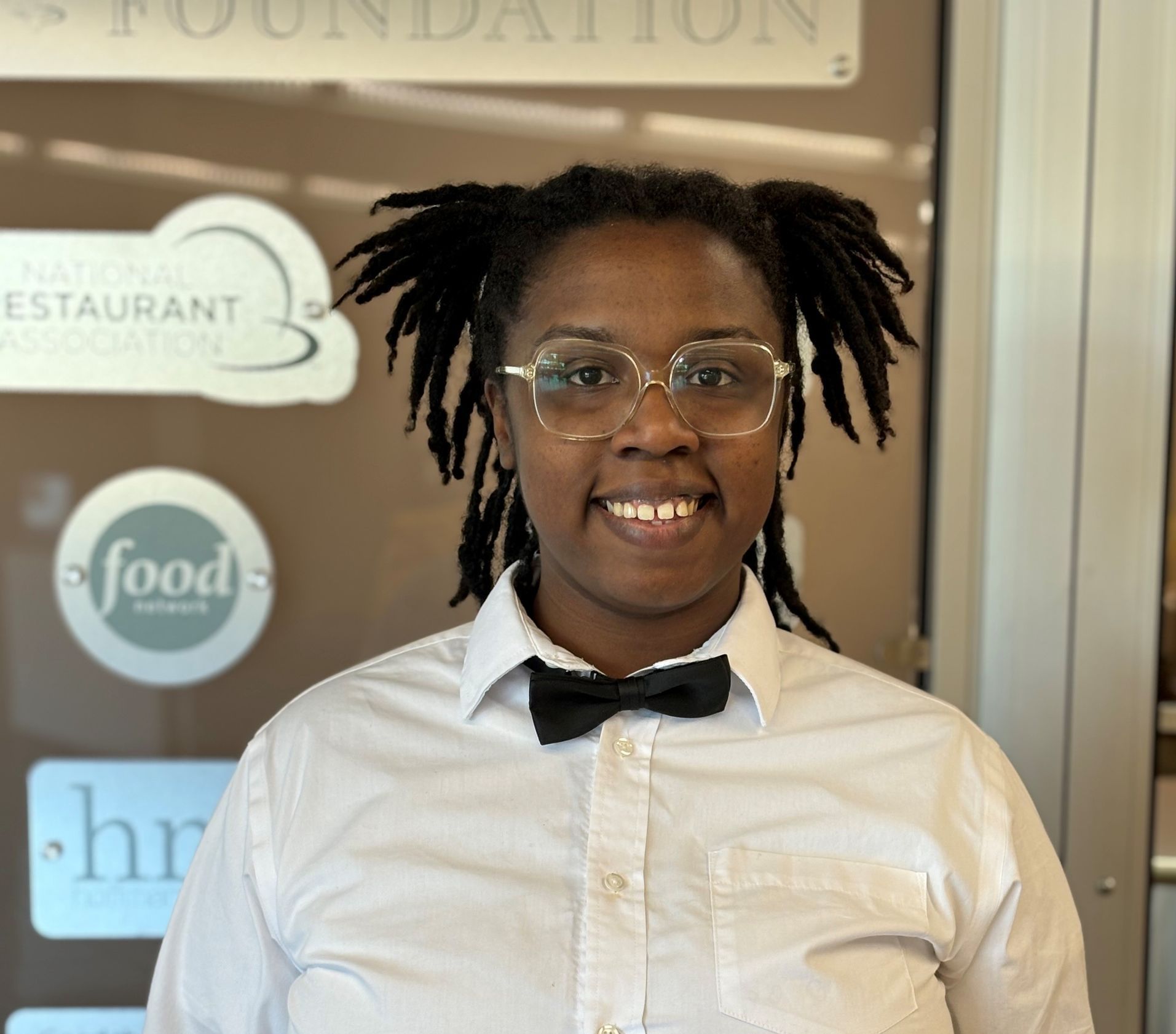AOS in Culinary Arts - Advanced Baking & Pastry
Building A Brighter Future as a Pastry Chef.
OVERVIEW
Creativity and passion are two traits that can’t be taught, but they can be molded, shaped, and sharpened with the right education. The skills, techniques, and knowledge you gain in culinary, in addition to the experiences, exposure, and relationships, can help to propel into a satisfying career you are passionate about. Here is everything you need to know about pursuing a degree in advanced baking and pastry.
Classes are held Monday through Thursday, from 8:00 am to 1:45 pm. This is 5 hours per day, 4 days per week for a weekly total of 20 hours (excluding 45 minutes per day for lunch). Additionally, students who do not have transfer credits for appropriate General Education classes will have class every Monday, Tuesday and Wednesday from 2:00 pm to 2:50 pm (for the first 3 semesters). These students will experience a weekly total of 23 hours (excluding 45 minutes per day for lunch).
Advanced Baking & Pastry Program Blogs
Advanced Baking & Pastry Program Video
COURSE DESCRIPTIONS
1st Semester (White Level)
CA 111-ServSafe® Food Safety and Sanitation (30 Lecture Clock Hours/ 2 Semester Credit Hours)
Designed to instruct the student in the basic principles of sanitation and sanitary requirements following a HACCP program in receiving, storing, pre-preparation, cooking and handling foods in a commercial kitchen. Special emphasis is given to time, temperature control, cross- contamination, and personal hygiene. This is the National Restaurant Association Educational Foundation’s (NRAEF) nationally recognized ServSafe® Course and is a Core Credential for the NRAEF ManageFirst Program®. Students are eligible to take the NRAEF certification test upon completion of this course to obtain the ServSafe® Sanitation Certification which is valid for five years. Cross Listed with HCM 111.
CA 101-Professional Cooking I (30 Lecture Clock Hours/ 2 Semester Credit Hours)
Introduction to the history of French Classic Haute Cuisine teaching the fundamentals of professional cooking techniques using moist and dry methods in a commercial food service facility. Students are introduced to basic nutrition, taught how to incorporate proper nutrition into their dishes, the fundamentals of recipe writing and interpretation, as well as the different types of menus used in commercial food service. Students will learn how to properly utilize commercial food equipment in a safe and sanitary manner. Pre-preparation techniques are covered with an emphasis on the proper use and handling of kitchen knives.
CA 121-Restaurant Production and Service I (30 Lab Clock Hours/ 1 Semester Credit Hour)
Students are introduced to the commercial kitchen and shown how to use and work with equipment to practice pre-preparation techniques for mise en place. Students are taught how to prep food items for proper cooking and are shown the proper techniques for using all commercial kitchen equipment safely. Proper use of knives is demonstrated with ample time allowed for the students to practice knife cutting techniques.
CA 109-Bread Basics (30 Lab Clock Hours/ 1 Semester Credit Hour)
Basic bread production including lean, rich, and laminated breads to gain an understanding of working with breads through study and manipulative skills.
CA 102-Professional Cooking II (60 Lecture Clock Hours/ 4 Semester Credit Hours)
An introduction to the use and production of stocks, sauces and soups. The fundamentals of stock making are explored along with specific stock-making techniques and how to produce the five lead sauces using the stocks produced as well as the fundamentals of making clear, thick and national soups.
CA 104-Professional Cooking IV (60 Lecture Clock Hours/ 4 Semester Credit Hours)
Students learn the basics of vegetable and starch cookery. Students learn to identify, handle, process and cook commonly used vegetables, starches, legumes, grains and pasta and how to control texture, flavor, color changes and nutrient losses. Students also learn the dynamics of vegetarian diets and how to plan nutritious vegetarian menus.
CA 103-Professional Cooking III (60 Lab Clock Hours/ 2 Semester Credit Hours)
Students learn the basics of meat, poultry and seafood cookery. Learn to identify the primal cuts of beef, lamb, veal and pork and list the fabricated cuts from each of them. The composition and structure of meat is described in terms of the relationship of the proper cooking techniques used in its cooking. Students are taught the proper handling and cooking of poultry, utilizing both dry and moist heat cooking methods with an emphasis on the correct procedure used for the “slow-roasting” of large birds.
OR
CA 110-Introduction to Baking and Pastry (60 Lab Clock Hours/ 2 Semester Credit Hours)
This course covers the fundamentals of the commercial kitchen bakeshop. Students are taught the fundamentals of bakeshop principles in relationship to how they are applied in cakes, pastries, cookies, ice creams, sorbets and pie production in a commercial bakery.
MAT 101-Essentials of Math (Mathematics) (45 Lecture Clock Hours/ 3 Semester Credit Hours)
This course encompasses the basics of practical math offering a comprehensive introduction to the concepts and applications of mathematics utilizing skill building modules which prepare the student with the skills and competencies that they will need to enter the workforce.
2nd Semester (Blue Level)
CA 103-Professional Cooking III (60 Lab Clock Hours/ 2 Semester Credit Hours)
Students learn the basics of meat, poultry and seafood cookery. Learn to identify the primal cuts of beef, lamb, veal and pork and list the fabricated cuts from each of them. The composition and structure of meat is described in terms of the relationship of the proper cooking techniques used in its cooking. Students are taught the proper handling and cooking of poultry, utilizing both dry and moist heat cooking methods with an emphasis on the correct procedure used for the “slow-roasting” of large birds.
OR
CA 110-Introduction to Baking and Pastry (60 Lab Clock Hours/ 2 Semester Credit Hours)
This course covers the fundamentals of the commercial kitchen bakeshop. Students are taught the fundamentals of bakeshop principles in relationship to how they are applied in cakes, pastries, cookies, ice creams, sorbets and pie production in a commercial bakery.
CA 122-Restaurant Production II (30 Lab Clock Hours/ 1 Semester Credit Hour)
The laboratory class is designed for students to practice proper cooking techniques in commercial food service. Students are given an extensive review of cooking techniques and procedures, measurements, knife skills and mise en place and are required to prepare and serve examples of each technique and procedure on meats, poultry, seafood, vegetables and starches for the faculty/staff/student meal service.
CA 132-Restaurant Service II (30 Lab Clock Hours/ 1 Semester Credit Hour)
The laboratory class is designed for students to practice proper serving techniques in commercial food service. Students learn proper serving techniques and wait staff service management.
CA 105-Professional Cooking V (30 Lecture Clock Hours/ 2 Semester Credit Hours)
Students learn the basics of salads, sandwiches, and hors d’oeuvres cookery, as well as the basics of hot and cold food presentation and garnish. Students are introduced to the types of salads produced in food service and their preparation techniques. Techniques for the production of different types of sandwiches and the proper production of hors d’oeuvres are demonstrated. The students are also taught the importance of presenting food attractively and are shown techniques in the use of the balance of color, shape texture and the creation of garnishes.
CA 106-Professional Cooking VI (30 Lecture Clock Hours/ 2 Semester Credit Hours)
Students learn the basics of breakfast cookery, dairy products and breakfast beverages. Students learn breakfast cookery with a focus on the many types of egg production, breakfast breads and breakfast meats and production of dairy products including a good overall introduction to cheeses. Proper coffee and tea service is also taught in this course.
CA 123-Restaurant Production III (30 Lab Clock Hours/ 1 Semester Credit Hour)
Students practice cooking techniques while preparing menu courses for the faculty/staff/student meal service. Students will focus on preparing meats, poultry, seafood, vegetables and starches utilizing both moist and dry heat cooking methods appropriately.
CA 133-Restaurant Service III (30 Lab Clock Hours/ 1 Semester Credit Hour)
Students practice techniques while serving food menu courses for the faculty/staff/student meal service. Students cultivate their front of the house service and management techniques, including training on the MICROS system.
CA 211-Introduction to Hospitality and Restaurant Management (30 Lecture Hours/ 2 Semester Credit Hours)
This course is designed as an overview and introduction to the hospitality and restaurant management industry, with a specific focus on leadership and management techniques. At the end of this course, students take the National Restaurant Educational Foundation’s (NRAEF) ManageFirst® test.
CA 112-Catering and Volume Food Service (30 Lecture Clock Hours/ 2 Semester Credit Hours)
Introductory course on catering for food service and hospitality managers which utilizes sound guidelines and a practical approach to operating and managing a catering business. The course includes the guidelines for on and off premise catering, hiring and managing catering personnel, writing contracts, sanitation, setting up a kitchen, setting up and using service equipment, conducting special events and kosher catering along with wine and bar service, menu making and food presentation. Cross Listed with HCM 112.
ENG 101-English Composition (Humanities) (45 Lecture Clock Hours/ 3 Semester Credit Hours)
A basic course on English grammar and composition designed to provide students with a detailed, structured approach to composition using the three steps of the writing process: pre-writing, writing and rewriting. The course includes a review of grammar, offers opportunities for general and career-focused writing, and encourages improvement through addressing the writer ‘s audience and purpose and by providing tools for proofreading and editing.
3rd Semester (Red Level)
CA 344-Advanced Boulangerie (30 Lecture Clock Hours and 30 Lab Clock Hours/ 3 Semester Credit Hours)
This course focuses on understanding artisan and advanced bread skills. Sourdough, multigrain leavened and unleavened breads, rich holiday breads, and higher manipulative shaping skills are executed.
CA 343-Cake and Entremet Methods (60 Lab Clock Hours/ 2 Semester Credit Hours)
This course covers the different methods of cakes, fillings, and icing production. Proper planning, layering, and assembly techniques are included. Garnishing, cake masking, fondant making, decorating and piping skills, and multi-step entremets are also practiced.
CA 221-Restaurant Production IV (30 Lab Clock Hours/ 1 Semester Credit Hour)
Students continue to use cooking techniques while preparing menu items for the faculty/staff/student meal service. This kitchen production laboratory is designed for the student to continue practicing the proper cooking methods in preparing quality food menu items with special emphasis on the more advanced recipes.
CA 231-Restaurant Service IV (30 Lab Clock Hours/ 1 Semester Credit Hour)
Students continue to use their learned techniques in serving food and beverage menu items for the faculty/staff/student meal service. Additionally, students demonstrate proficiency in front of the house service.
NUT 201-Nutrition (Natural or Applied Science) (30 Lecture Clock Hours/ 2 Semester Credit Hours)
This course is thorough overview of basic nutrition. This course offers the student a thorough and up-to-date overview of information on nutrition and diet and includes topics such as the latest Dietary Guidelines for Americans, My Pyramid, balanced menu options, basic principles of food presentation, meeting special dietary needs, and weight management.
MAT 102-Controlling Costs (Mathematics) (30 Lecture Clock Hours/ 2 Semester Credit Hours)
This course focuses on the mathematics and decision-making required to control the costs within the foodservice industry. Topics include accounting and profitability, as well as other necessary components needed to effectively and successfully manage a restaurant.
CA 150-Dessert Production (30 Lecture Clock Hours and 30 Lab Clock Hours/ 3 Semester Credit Hours)
This course will require the student to produce various desserts that are considered fundamental in baking preparations. Advanced pastry techniques, puddings, mousses, Bavarians, and plating components, along with finish techniques will be covered. The art of plate design, color, form textures, and flavor profiles will be practiced.
PSY 201-Psychology for Leadership (Behavioral Science) (45 Lecture Clock Hours/ 3 Semester Credit Hours)
This course is a study of the psychology used by leaders and managers in the business world. This course covers the many aspects of psychology needed by leaders and managers in today’s businesses in order to manage personnel more effectively. The course’s subjects include: psychology for successful leading, forging a common direction, working together, making use of problems and barriers, and becoming a leader.
4th Semester (Green Level)
CA 222-Restaurant Production V (30 Lab Clock Hours/ 1 Semester Credit Hour)
Learn “A La Carte” production techniques and procedures used in full service restaurants while cooking food menu courses for the faculty/staff/student meal service.
CA 232-Restaurant V (30 Lab Clock Hours/ 1 Semester Credit Hour)
Students will continue to demonstrate proficiency in front of the house service techniques, as well as focusing on front of the house management techniques. Students will begin to learn table-side service and higher service standards.
CA 311-Wine Fundamentals (30 Lecture Hours I 2 Semester Credit Hours)
A thorough introductory course on wine presenting culinary arts and hospitality students with the practical and detailed knowledge necessary to manage wine and wine sales. The course encompasses the basics of wine, the wine regions of the world, types of wine and the business of wine. Cross Listed with HCM 311.
LS 200–Career Management (Humanities) (30 Lecture Clock Hours/ 2 Semester Credit Hours)
This course provides students with an overview of skills they learned in previous courses relating to achieving success in the workplace. Specific topics include transforming personal interests into professional goals; searching for, securing, and maintaining employment; seeking out and making networking opportunities; and professional development.
CA 345-Custom Cakes (30 Lab Clock Hours/ 1 Semester Credit Hour)
This course is designed to cover the introduction of producing customized cakes to include themed and sculpted cakes. The practice of decorative mediums of modeling chocolate, marzipan, pastillage, and fondant are incorporated.
CA 346-Confections (30 Lab Clock Hours/ 1 Semester Credit Hour)
This course includes the practice and theory of producing a variety of candies including: chocolate, sugar, aerated, fudge, taffy, and marshmallow.
CA 347-Centerpiece Display (60 Lab Clock Hours/2 Semester Credit Hours)
Students produce showpieces through instructor led projects in the mediums of sugar, chocolate, and dead dough. Display techniques and theme composition are also included.
CA 223-Restaurant Production VI (30 Lab Clock Hours/ 1 Semester Credit Hour)
Students continue to practice A La Carte production techniques while focusing on managing the kitchen to produce the faculty/staff/student meal.
CA 233-Restaurant Service VI (30 Lab Clock Hours/ 1 Semester Credit Hour)
Students continue to practice serving techniques while focusing on managing the front of the house in a fine-dining establishment.



